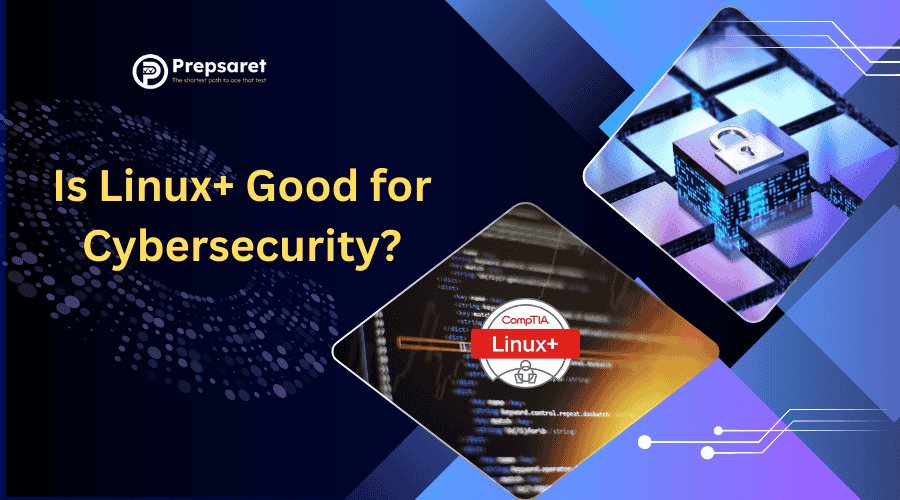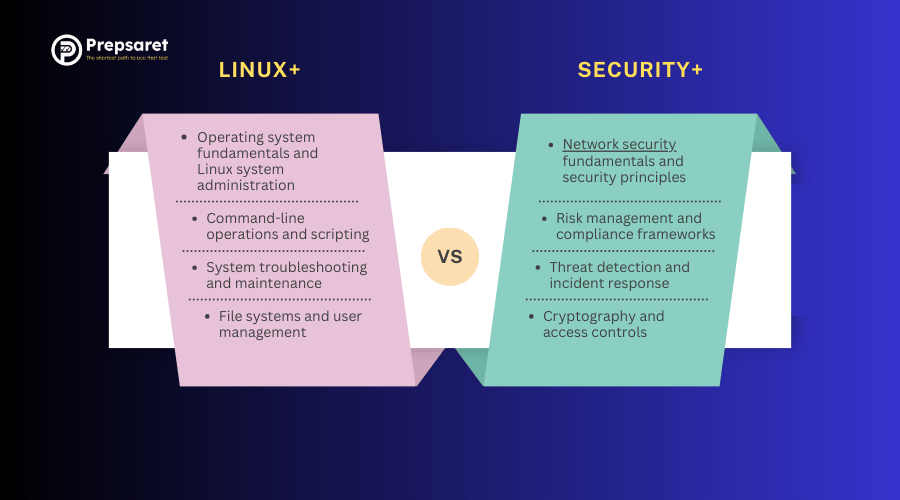Linux+ stands as a recognized entry-level certification that opens doors for IT and cybersecurity professionals worldwide. With Linux powering most servers and forming the backbone of cybersecurity tools, ethical hacking platforms, and penetration testing environments, understanding this operating system becomes crucial for security careers.
Certifications like Linux+ help build foundational skills that employers actively seek in today’s competitive market. Ready to start your Linux+ journey? Try Prepsaret‘s free Linux+ practice exam questions to test your current knowledge and identify areas for improvement.
Is CompTIA Linux+ Worth It?
The value of CompTIA Linux+ certification extends far beyond basic IT knowledge, especially in cybersecurity roles. This certification validates your understanding of Linux system administration, command-line operations, and troubleshooting skills that security professionals use daily.
Industry recognition for Linux+ continues growing as more organizations adopt Linux-based security infrastructure. Major employers in cybersecurity, including government agencies, consulting firms, and tech companies, actively seek candidates with proven Linux expertise. The certification demonstrates your ability to:
- Navigate Linux environments confidently
- Manage user permissions and system security
- Execute command-line operations efficiently
- Troubleshoot network and system issues
- Understand file systems and security protocols
The demand for Linux skills in cybersecurity makes this certification particularly valuable for career advancement and salary increases.
Best Linux Certification for Cybersecurity
When choosing the best Linux certification for beginners entering cybersecurity, several options deserve consideration. Each certification targets different skill levels and career objectives:
For Complete Beginners
- Linux Essentials certification provides foundational knowledge
- Covers basic concepts without overwhelming technical depth
- Perfect stepping stone before tackling professional-level certifications
For Cybersecurity-Focused Professionals
- Linux+ certification for cybersecurity offers comprehensive coverage
- Balances system administration with security-relevant skills
- Industry-recognized credential that employers trust
Advanced Options:
- Red Hat vs Linux+ comparison shows RHCSA targets enterprise environments
- LPIC-1 focuses on vendor-neutral Linux administration
- Specialized certifications like Kali Linux target specific security applications
The best Linux certifications for cybersecurity depend on your current experience level and career goals. Beginners benefit most from Linux+ due to its comprehensive coverage and industry acceptance.
Is CompTIA Linux+ Hard?
The difficulty of Linux+ varies significantly based on your background and preparation approach. For beginners with limited Linux experience, the certification presents moderate challenges that proper study strategies can overcome.
Difficulty Breakdown by Experience Level
- Complete Beginners: Expect 3-4 months of dedicated study
- IT Professionals: Usually require 6-8 weeks of preparation
- Experienced Linux Users: May need only 2-4 weeks of focused review
Study Strategies to Reduce Difficulty
- Start with hands-on practice in virtual environments
- Use multiple learning resources including video courses and practice labs
- Take regular practice exams to identify knowledge gaps
- Join study groups or online communities for support
- Focus extra time on command-line operations and scripting
The key to success lies in consistent practice rather than cramming theoretical knowledge. Most candidates find the practical, hands-on approach more effective than memorizing commands.
Read more: How Hard is the Linux+ Certification?
Linux Essentials vs Linux+ Certifications
Understanding the differences between Linux Essentials and Linux+ helps you choose the right starting point for your cybersecurity career path.
Linux Essentials Certification
- Entry-level introduction to Linux concepts
- Covers basic commands and system navigation
- No hands-on lab requirements
- Suitable for absolute beginners
- Limited industry recognition for cybersecurity roles
Linux+ Certification
- Professional-level validation of Linux skills
- Comprehensive coverage of system administration
- Includes advanced topics like security and networking
- Highly valued by cybersecurity employers
- Provides foundation for specialized security certifications
For cybersecurity aspirations, Linux+ offers significantly more value. While Linux Essentials provides a gentle introduction, Linux+ delivers the depth and breadth that security professionals need in real-world scenarios.
Linux+ Jobs in Cybersecurity
Linux+ certification opens doors to numerous cybersecurity positions where Linux system administration knowledge proves essential. Security teams increasingly rely on professionals who understand both operating system security and traditional cybersecurity principles.
Here are some of the common job roles for Linux+ holders:
- Security Analyst: Monitor and analyze security events on Linux-based systems
- SOC Analyst: Investigate incidents using Linux command-line tools
- Penetration Tester: Leverage Linux environments for ethical hacking activities
- Network Security Specialist: Secure Linux-based network infrastructure
- Incident Response Specialist: Investigate breaches on Linux systems
Employers particularly value candidates who combine Linux expertise with security knowledge. The ability to navigate Linux environments efficiently makes security professionals more effective at:
- Analyzing log files and system activities
- Implementing security controls and monitoring
- Using open-source security tools effectively
- Understanding server and network configurations
Is CompTIA Linux+ Enough for a Cybersecurity Career?
While Linux+ provides an excellent foundation, it typically isn’t sufficient alone for most cybersecurity positions. The certification serves as a crucial building block that supports additional specialized training.
Why Linux+ Alone May Not Be Enough
- Cybersecurity requires broader knowledge beyond operating systems
- Employers seek candidates with multiple relevant certifications
- Specialized security skills need dedicated training and validation
Recommended Certification Combinations:
- Linux+ paired with CompTIA certifications like Security+ or CySA+
- Linux+ followed by ethical hacking certifications
- Linux+ combined with vendor-specific security training
The security certifications roadmap typically includes Linux+ as a foundation, followed by specialized certifications that build upon that base knowledge. This approach creates well-rounded professionals who understand both systems and security.
Does Linux+ Certification Help With Penetration Testing?
Linux+ certification provides essential skills that directly support penetration testing activities, even though it’s not specifically designed as an ethical hacking certification.
Linux+ Skills That Support Penetration Testing:
- Command-Line Proficiency: Navigate target systems efficiently during assessments
- File System Understanding: Locate sensitive data and configuration files
- Permission Management: Identify privilege escalation opportunities
- Network Configuration: Understand network services and potential vulnerabilities
- Scripting Basics: Automate repetitive tasks during testing
Many open-source security tools run exclusively on Linux platforms, making Linux+ knowledge invaluable for penetration testers. Tools like Metasploit, Nmap, and Wireshark require comfortable Linux operation for maximum effectiveness.
However, Linux+ serves as preparation rather than specialization. Dedicated ethical hacking certifications build upon Linux+ foundations to develop advanced penetration testing skills.
Related post: CompTIA Pentest+ Certification
Should I Take Linux+ Before Security+ or CEH?
The sequence of certifications significantly impacts your learning efficiency and career progression. Most experts recommend Linux+ as a foundational certification before pursuing specialized security credentials.
Benefits of Taking Linux+ First
- Provides hands-on technical skills that support advanced learning
- Creates familiarity with tools and environments used in security testing
- Builds confidence with command-line operations essential for security work
Recommended Certification Sequence
- Linux+ Certification: Establish operating system expertise
- Security+: Learn broad security principles and frameworks
- CEH or CySA+: Develop specialized ethical hacking or analysis skills
This progression ensures you have practical skills to support theoretical security knowledge, making advanced certifications easier to understand and apply.
Linux+ vs Security+ for Cybersecurity Beginners
Choosing between Linux+ and Security+ depends on your background and immediate career objectives. Both certifications offer value for cybersecurity beginners, but they focus on different aspects of security knowledge.
Linux+ Focus Areas
- Operating system fundamentals and Linux system administration
- Command-line operations and scripting
- System troubleshooting and maintenance
- File systems and user management
Security+ Focus Areas
- Network security fundamentals and security principles
- Risk management and compliance frameworks
- Threat detection and incident response
- Cryptography and access controls
Recommendations by Career Path
- Choose Linux+ first if you need hands-on technical skills immediately
- Start with Security+ for broader security concept understanding
- Consider your current technical background when deciding
Many professionals benefit from earning both certifications, as they complement each other perfectly in cybersecurity roles.
Is Linux+ Required for Cybersecurity Jobs?
Linux+ isn’t typically a strict requirement for cybersecurity positions, but it provides significant advantages that make candidates more attractive to employers.
Why Linux+ Isn’t Always Required:
- Many cybersecurity roles focus on other technologies
- Alternative certifications may meet employer needs
- Experience can sometimes substitute for formal certification
Why Linux+ Provides Competitive Advantage:
- Demonstrates practical technical skills employers value
- Shows commitment to professional development
- Enables more effective use of security tools and environments
- Supports career advancement into technical leadership roles
For entry-level security positions, Linux+ can differentiate your resume from candidates with only theoretical security knowledge.
Is Linux+ a Good Certification for Ethical Hacking?
Linux+ provides excellent preparation for ethical hacking careers by establishing essential technical foundations that penetration testers use daily.
Linux+ Skills That Support Ethical Hacking
- Command-line expertise for tool execution and system navigation
- Understanding of file permissions for privilege escalation assessment
- Network configuration knowledge for identifying attack vectors
- Scripting basics for automating reconnaissance and exploitation
- System administration skills for understanding target environments
While Linux+ doesn’t teach hacking techniques directly, it provides the technical foundation that makes learning ethical hacking more efficient and effective. Most penetration testing tools and methodologies assume Linux proficiency.
Linux+ vs Other Certifications
Comparing Linux+ with alternative certifications helps you make informed decisions about your professional development path.
Linux vs RHCSA:
- Linux+ offers vendor-neutral knowledge applicable across distributions
- RHCSA focuses specifically on Red Hat Enterprise Linux environments
- Choose Linux+ for broader applicability, RHCSA for Red Hat-specific roles
Linux+ vs LPIC-1:
- Both provide comprehensive Linux knowledge
- LPIC-1 offers more international recognition in some markets
- Linux+ includes CompTIA’s established reputation and support network
Linux+ vs Vendor-Specific Certifications:
- Vendor certifications provide deeper product knowledge
- Linux+ offers flexibility across different Linux environments
- Consider your target employers and their preferred technologies
For cybersecurity careers, Linux+ typically provides the best balance of comprehensive coverage and industry recognition.
Best Linux+ Practice Exams
Success on the Linux+ certification exam requires extensive practice with realistic questions that mirror the actual testing experience. Linux+ practice exams help identify knowledge gaps while building confidence for test day.
Essential Features of Quality Practice Exams
- Realistic question formats matching the official exam
- Detailed explanations for both correct and incorrect answers
- Performance tracking to monitor improvement over time
- Updated content reflecting current exam objectives
Recommended Practice Exam Sources
- Prepsaret: Offers free Linux+ practice test questions with detailed explanations
- CompTIA Official Resources: Provides authentic sample questions
- Third-Party Training Providers: Multiple perspectives on exam content
Regular practice testing should form a central part of your Linux+ preparation strategy, helping ensure you’re ready for success on exam day.
Why Choose Prepsaret for CompTIA Linux+ Exam Prep
Prepsaret stands out among Linux+ preparation resources by offering realistic practice exams that accurately reflect the actual certification testing experience. Here are some of the key advantages of Prepsaret:
- Realistic Practice Exams: Questions mirror actual exam format and difficulty
- Detailed Explanations: Understand why answers are correct or incorrect
- Progress Tracking: Monitor improvement and identify weak areas
- Updated Content: Regular updates ensure alignment with current exam objectives
- Free Practice Questions: Test the platform before committing to paid resources
The combination of comprehensive practice exams and detailed study guidance makes Prepsaret an excellent choice for Linux+ candidates serious about passing on their first attempt.
Ready to start practicing? Try Prepsaret’s free Linux+ practice exams to begin your certification journey today.
FAQs About Linux+ and Cybersecurity
Is learning Linux good for cybersecurity?
Yes, Linux knowledge is essential for cybersecurity professionals since most security tools, servers, and testing environments run on Linux distributions, making it fundamental for career success.
Is Linux+ entry level?
Linux+ serves as an entry-level certification for Linux system administration while requiring some basic IT knowledge, making it accessible to beginners with foundational computer skills.
Is Kali Linux the best for cyber security?
Kali Linux excels specifically for penetration testing and ethical hacking with specialized tools, but general-purpose distributions like Ubuntu work better for broader security applications.
Is Linux better than Windows for cybersecurity?
Linux offers superior security through open-source transparency, better permission controls, and extensive security tools, while Windows provides broader enterprise integration and user familiarity.
Is Kali Linux beginner friendly?
Kali Linux challenges beginners due to its specialized nature and advanced tools, making Ubuntu or other mainstream distributions better choices for learning fundamental Linux concepts first.
Start Preparing for CompTIA Linux+ Today!
Linux+ certification provides cybersecurity beginners and professionals with essential skills that employers actively seek in today’s competitive job market. Success requires combining quality study materials with extensive hands-on practice.
Practice exams plus comprehensive study resources equals certification success and career advancement in cybersecurity. Begin your preparation journey now with Prepsaret’s free Linux+ practice exam questions and take the first step toward advancing your cybersecurity career.





